Gulliver's Travels, Jonathan Swift [best romance books of all time TXT] 📗
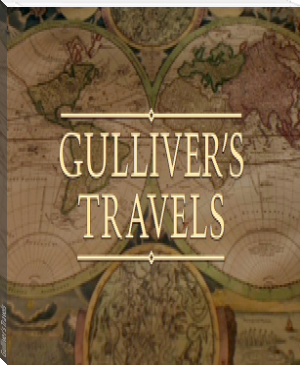
- Author: Jonathan Swift
Book online «Gulliver's Travels, Jonathan Swift [best romance books of all time TXT] 📗». Author Jonathan Swift
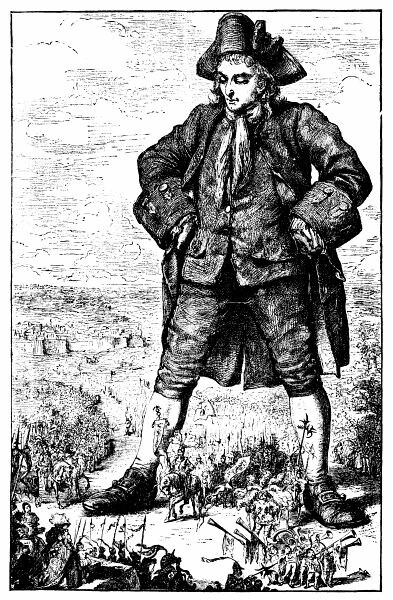
"HE COMMANDED HIS GENERALS TO DRAW UP THE TROOPS."
GULLIVER'S TRAVELS
INTO SEVERAL REMOTE REGIONS OF THE WORLD
BY
JONATHAN SWIFT, D.D.
PART I.
A VOYAGE TO LILLIPUT.

CHAPTER I.
THE AUTHOR GIVES SOME ACCOUNT OF HIMSELF AND FAMILY: HIS FIRST INDUCEMENTS TO TRAVEL. HE IS SHIPWRECKED, AND SWIMS FOR HIS LIFE; GETS SAFE ASHORE IN THE COUNTRY OF LILLIPUT; IS MADE A PRISONER, AND CARRIED UP THE COUNTRY.
My father had a small estate in Nottinghamshire; I was the third of five sons. He sent me to Emmanuel College in Cambridge at fourteen years old, where I resided three years, and applied myself close to my studies; but the charge of maintaining me, although I had a very scanty allowance, being too great for a narrow fortune, I was bound apprentice to Mr. James Bates, an eminent surgeon in London, with whom I continued four years; and my father now and then sending me small sums of money, I laid them out in learning navigation, and other parts of the mathematics useful to those who intend to travel, as I always believed it would be, some time or other, my fortune to do. When I left Mr. Bates, I went down to my father, where, by the assistance of him, and my uncle John and some other relations, I got forty pounds,[2] and a promise of thirty pounds a year, to maintain me at Leyden. There I studied physic two years and seven months, knowing it would be useful in long voyages.
Soon after my return from Leyden, I was recommended by my good master, Mr. Bates, to be surgeon to the "Swallow," Captain Abraham Pannell, commander; with whom I continued three years and a half, making a voyage or two into the Levant,[3] and some other parts. When I came back I resolved to settle in London; to which Mr. Bates, my master, encouraged me, and by him I was recommended to several patients. I took part of a small house in the Old Jewry; and, being advised to alter my condition, I married Mrs. Mary Burton,[4] second daughter to Mr. Edmund Burton, hosier in Newgate Street, with whom I received four hundred pounds for a portion.
But my good master, Bates, dying in two years after, and I having few friends, my business began to fail; for my conscience would not suffer me to imitate the bad practice of too many among my brethren. Having, therefore, consulted with my wife, and some of my acquaintance, I determined to go again to sea. I was surgeon successively in two ships, and made several voyages, for six years, to the East and West Indies, by which I got some addition to my fortune. My hours of leisure I spent in reading the best authors, ancient and modern, being always provided with a good number of books; and, when I was ashore, in observing the manners and dispositions of the people, as well as learning their language, wherein I had a great facility, by the strength of my memory.
The last of these voyages not proving very fortunate, I grew weary of the sea, and intended to stay at home with my wife and family. I removed from the Old Jewry to Fetter Lane, and from thence to Wapping, hoping to get business among the sailors; but it would not turn to account. After three years' expectation that things would mend, I accepted an advantageous offer from Captain William Prichard, master of the "Antelope," who was making a voyage to the South Sea.[5] We set sail from Bristol, May 4, 1699; and our voyage at first was very prosperous.
It would not be proper, for some reasons, to trouble the reader with the particulars of our adventures in those seas. Let it suffice to inform him, that, in our passage from thence to the East Indies, we were driven by a violent storm, to the northwest of Van Diemen's Land.[6]
By an observation, we found ourselves in the latitude of 30 degrees and 2 minutes south. Twelve of our crew were dead by immoderate labor and ill food; the rest were in a very weak condition.
On the fifth of November, which was the beginning of summer in those parts, the weather being very hazy, the seamen spied a rock within half a cable's length of the ship;[7] but the wind was so strong, that we were driven directly upon it, and immediately split. Six of the crew, of whom I was one, having let down the boat into the sea, made a shift to get clear of the ship and the rock. We rowed, by my computation, about three leagues, till we were able to work no longer, being already spent with labor, while we were in the ship. We, therefore, trusted ourselves to the mercy of the waves; and, in about half an hour, the boat was overset by a sudden flurry from the north. What became of my companions in the boat, as well as those who escaped on the rock, or were left in the vessel, I cannot tell, but conclude they were all lost.
For my own part, I swam as fortune directed me, and was pushed forward by wind and tide. I often let my legs drop, and could feel no bottom; but, when I was almost gone, and able to struggle no longer, I found myself within my depth; and, by this time, the storm was much abated.
The declivity was so small that I walked near a mile before I got to the shore, which I conjectured was about eight o'clock in the evening. I then advanced forward near half a mile, but could not discover any sign of houses or inhabitants; at least, I was in so weak a condition, that I did not observe them. I was extremely tired, and with that, and the heat of the weather, and about half a pint of brandy that I drank as I left the ship, I found myself much inclined to sleep. I lay down on the grass, which was very short and soft, where I slept sounder than ever I remembered to have done in my life, and, as I reckoned, about nine hours; for, when I awaked, it was just daylight. I attempted to rise, but was not able to stir: for as I happened to lie on my back, I found my arms and legs were strongly fastened on each side to the ground; and my hair, which was long and thick, tied down in the same manner. I likewise felt several slender ligatures across my body, from my arm-pits to my thighs. I could only look upwards, the sun began to grow hot, and the light offended my eyes.
I heard a confused noise about me; but, in the posture I lay, could see nothing except the sky. In a little time, I felt something alive moving on my left leg, which, advancing gently forward over my breast, came almost up to my chin; when, bending my eyes downward, as much as I could, I perceived it to be a human creature, not six inches high, with a bow and arrow in his hands, and a quiver at his back. In the meantime I felt at least forty more of the same kind (as I conjectured) following the first.
I was in the utmost astonishment, and roared so loud that they all ran back in a fright; and some of them, as I was afterwards told, were hurt with the falls they got by leaping from my sides upon the ground. However, they soon returned, and one of them, who ventured so far as to get a full sight of my face, lifting up his hands and eyes by way of admiration, cried out in a shrill, but distinct voice—Hekinah degul! the others repeated the same words several times, but I then knew not what they meant.
I lay all this while, as the reader may believe, in great uneasiness. At length, struggling to get loose, I had the fortune to break the strings, and wrench out the pegs, that fastened my left arm to the ground; for by lifting it up to my face, I discovered the methods they had taken to bind me, and, at the same time, with a violent pull, which gave me excessive pain, I a little loosened the strings that tied down my hair on the left side, so that I was just able to turn my head about two inches.
But the creatures ran off a second time, before I could seize them; whereupon there was a great shout in a very shrill accent, and after it ceased, I heard one of them cry aloud, Tolgo phonac; when, in an instant, I felt above an hundred arrows discharged on my left hand, which pricked me like so many needles; and, besides, they shot another flight into the air, as we do bombs in Europe, whereof many, I suppose, fell on my body (though I felt them not), and some on my face, which I immediately covered with my left hand.
When this shower of arrows was over, I fell a-groaning with grief and pain, and then striving again to get loose, they discharged another volley larger than the first, and some of them attempted with spears to stick me in the sides; but by good luck I had on me a buff jerkin,[8] which they could not pierce. I thought it the most prudent method to lie still, and my design was to continue so till night, when, my left hand being already loose, I could easily free myself; and as for the inhabitants, I had reason to believe I might be a match for the greatest army they could bring against me, if they were all of the same size with him that I saw.
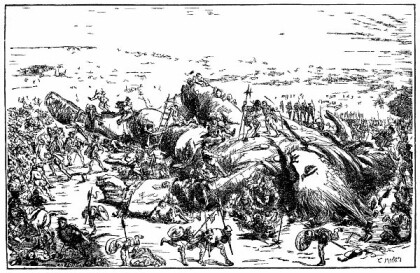
"I LAY ALL THIS WHILE IN GREAT UNEASINESS"
But fortune disposed otherwise of me. When the people observed I was quiet, they discharged no more arrows: but, by the noise I heard, I knew their numbers increased; and about four yards from me, over against my right ear, I heard a knocking for above an hour, like that of people at work; when, turning my head that way, as well as the pegs and strings would permit me, I saw a stage erected, about a foot and a half from the ground, capable of holding four of the inhabitants, with two or three ladders to mount it; from whence one of them, who seemed to be a person of quality, made me a long speech, whereof I understood not one syllable.
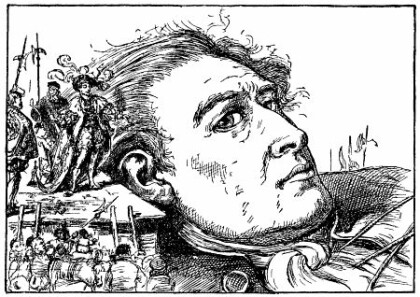
But I should have mentioned, that before the principal person began his oration, he cried out three times, Langro debul san (these words, and the former, were afterwards repeated, and explained to me). Whereupon immediately about fifty of the inhabitants came and cut the strings that fastened the left side of my head, which gave me the liberty of turning it to the right, and of observing the person and gesture of him that was to speak. He appeared to be of a middle age, and taller than any of the other three who attended him, whereof one was a page that held up his train, and seemed to be somewhat longer than my middle finger; the other two stood one on each side, to support him. He acted every part of an orator, and I could observe many periods of threatenings, and others of promises, pity, and kindness.
I answered in a few words, but in the most submissive manner, lifting up my left hand, and both my eyes, to the sun, as calling him for a witness: and, being
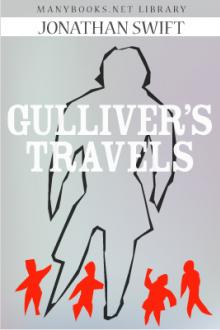
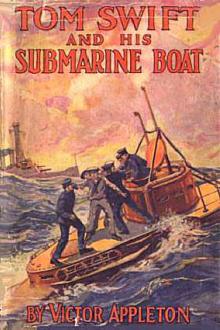



Comments (0)